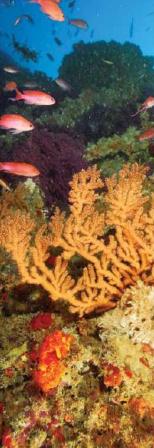Effects of Ocean Acidification on Marine Species & Ecosystems

Oceana acidification may cause many negative effects on a variety of marine species and ecosystems, which would have rippling consequences throughout the entire ocean. One of the most devastating impacts of rising ocean acidity could be the collapse of food webs
Marine animals interact in complex food webs that may be disrupted by ocean acidification due to losses in key species that will have trouble creating calcium carbonate shells in acidified waters. Some species of calcifying plankton that are threatened by ocean acidification form the base of marine food chains and are important sources of prey to many larger organisms.
Tiny swimming sea snails called pteropods are considered the ‘potato chips of the sea’ as they serve as a critical part of the arctic marine food web, ultimately feeding whales and other top predators. Pteropod shells are expected to dissolve in acidity levels predicted by the end of this century and may not be able to survive. Population crashes or changes in the distribution of pteropods would have serious implications for some of the most abundant marine ecosystems.
Other important calcifying species have been witnessed to have troubles in acidified waters.
Sea urchins are important grazers and can help to protect coral reefs from encroaching algae. Young sea urchins have been observed to grow slower and have thinner, smaller, misshapen protective shells when raised in acidified conditions, like those expected to exist by the year 2100. Slower growth rates and deformed shells may leave urchins more vulnerable to predators and decrease their ability to survive. Furthermore, under acidified conditions the sperm of some sea urchins swim more slowly, this reduces their chances of finding and fertilizing an egg, forming an embryo and developing into sea urchin larvae.
Brittle stars, which are important burrowers and prey items for flatfish, appear to be very vulnerable to increasing ocean acidity both as adults and larvae, which could result in severe population declines in the future. In acidified conditions, adult brittle stars lose muscle mass when regenerating their arms and many if not all brittle star larvae will not survive.
Even marine animals that do not create calcium carbonate shells or skeletons may be threatened by the increasing acidity of the oceans.
Squid are the fastest invertebrates in the oceans and require high levels of oxygen for their high-energy swimming. Increasingly acidic oceans interfere with the acidity of a squid’s blood and consequently the amount of oxygen that it can carry. Squid are important prey for many marine mammals, including beaked and sperm whales. Squid fisheries are also the most lucrative fishery in California accounting for 25 million dollars in revenues in 2008.
Some marine fishes have also shown vulnerability to acidification. While adult fish may be relatively insensitive to ocean acidification, their eggs and larvae may not be able to develop properly due to changes in ocean chemistry. Clownfish and damselfish larvae have shown a reduced sense of smell in acidified conditions which led to riskier swimming behavior. Increased levels of carbon dioxide have been associated with these fish being more active, swimming further away from shelter and not responding to threats such as predators. In studies, five to nine times more fish died because of their risky behavior than those not in acidified conditions.
As the acidity of the ocean increases, they are simultaneously getting warmer due to climate change. These factors, when combined, may create even more problems than either would create independently. For example, increased temperature combined with the acidity levels expected by the end of this century proved lethal for one species of cardinalfish tested in the laboratory.
There will likely be some species that are able to flourish in an acidified ocean, either because increased carbon dioxide levels benefit them directly or because their competitors are directly harmed by it. The only problem is that the species that appear to be best suited to prosper in high-carbon dioxide conditions, such as jellyfish and algae, are those that we currently see as nuisance, or weedy species.
In an acidified ocean there will be ecological winners and losers, but overall, marine ecosystems may change for the worse. They may become less vibrant and diverse, devoid of the animals we love and depend upon and full of those that present less value.
As ocean chemistry continues to change, the many goods and services they provide could dwindle, forcing millions of people to find new food sources, new homes and new sources of income. Adapting to these losses will take huge resources from the global community and in some cases adaptation will not be possible. A smarter future is one where we reduce carbon dioxide emissions, transition to cleaner, renewable sources of energy and prevent the need for large-scale adaptation.



